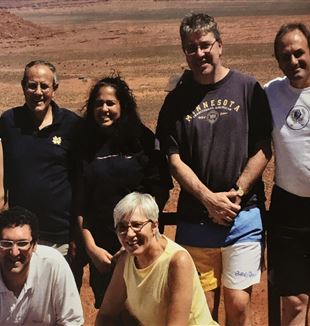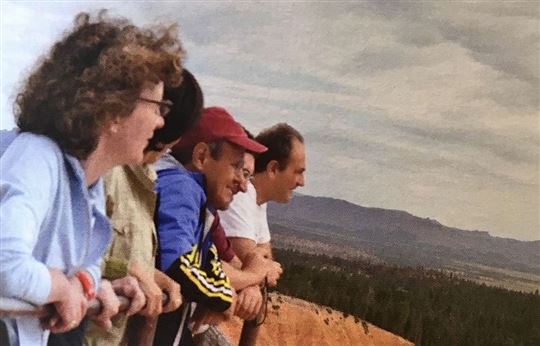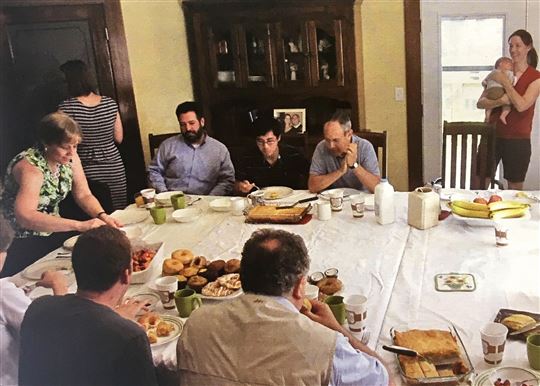
Coast to Coast
In July, among U.S. communites across the country, a series of surprising encounters with Fr. Julián Carrón took place.In July, among U.S. communites across the country, a series of surprising encounters with Fr. Julián Carrón took place–a group of DC students, a young priest from the Bible-belt, nurses and doctors of the Mayo Clinic, a new mother in Minnesota, some professors at Notre Dame, and many others. This visit became a mutual exploration of what real freedom means. (The first of two articles...)
"You keep re-proposing the same thing to everyone–the essential–in different ways," I said. "It's because it's all I have; everything else is a consequence," responded Fr. Julián Carrón. That exchange took place about halfway through our nearly one-month, epic journey across the United States. Indeed, witnessing Fr. Carrón's continuous challenge and the change that accepting such a challenge has produced in friends of all ages, races, social standings, and histories from every corner of the United States filled me with gratitude for the grace to see Christ risen and present among us.
The adventure began in the countryside of upstate New York, about two hours north of New York City, where more than three hundred friends (and more than half of them under the age of 18!) from the Northeast had gathered for a CL vacation. One of the leitmotifs of the encounter with Fr. Carrón all across the country immediately emerged from numerous friends: "He's so normal!" Paolo commented, "I couldn't believe he just got in line and got his food with the rest of us–to tell the truth, it made me stop trying to cut the line...!"
"WHY ARE YOU SO HAPPY?" But this apparent normalcy carried something extraordinary inside, as witnessed by Vincent, a high school student at that vacation, who wrote of his encounter with Fr. Carrón over breakfast with some other high school students: "Fr. Carrón came over with his tray and asked if he could join us. He looked around the table and asked each of us where we are from and go to school, but not as it would've normally been–small talk. The way he looked at us was one of real interest in us, of real love for us, not just filler conversation or curiosity. In fact, Fr. Carrón didn't treat anything we were talking about as small talk but spoke about meeting Don Giussani and the Movement, why he is a priest, his brothers and sisters and home in Spain, the skits, and even basketball. He spoke of all these things in a way that was full of life and energy. He was happy in a way that I experience in bits or in phases. So a question emerged in me: 'Who is this guy and why is he like this?'
"After about 20 minutes, he got up to leave. But there was a question on my mind that all of my friends shared, so we asked him, 'How is it that you are so happy? Are you always this happy?' He sat back down and said that he is almost always happy because living the relationship with Christ is the most beautiful thing and that all of our life–especially the difficult things–is the chance to see the strength of the friendship with Him. In the end, he said to us, 'So when I come back I want to hear how this is going for all of you,' and left. I sat there surprised and grateful because in the huge gift of Fr. Carrón, Christ was clearly with us at that table. Or else, how is the completely attractive and lively way he lives possible or how is it possible that his having one meal with us can open our hearts and fill us with such a visible joy? And, even after, I am still grateful for his visit, as a great sign of the huge preference of God towards me, a preference that continues in my life in so many surprising ways."
VICTORY OVER THE PHARAOH. At the final assembly, one of the most remarkable testimonies came from Monica, a young teacher who had recently lost and then regained her job. She told of how, upon informing her boss of her pregnancy and the delivery date in early September, she was informed that her school would not be able to offer her a contract. In the conversation with a friend about her outrage because of her sense of injustice, she was challenged. Her friend reminded her of the Israelites in Egypt and how the unjust use of the power granted to the Pharaoh by God became the opportunity to witness God's victory over human power. Monica took up her friend's challenge, continuing to work harder than ever, even inventing new initiatives with her students, never seen before in her school. At the end of the year her boss summoned her to a second meeting and offered her a contract, telling her, "When I told you that we would not offer you a contract next year, you were so certain," and then asking, "How could you be so and continue to work so well?"
Fr. Carrón exploded: "What is different between now and before? Saying, 'God is victorious,' is not the same as seeing it with my own eyes! We can see that what you are saying is an experience, not a quote. We can repeat certain true statements, as true, without this certainty. What experience adds is certainty. Even if your boss had not offered you the job again, the victory was already in the way you were living the job!"
After wrapping up the assembly, it was off to Greenville, South Carolina, to visit with friends from the Southeast. We gathered at a Catholic high school, where a close friend, Keith, is principal. Here, Fr. Carrón gave a public presentation on education. His focus revealed its novelty from the start, as he posed the question, "Many speak of an emergency in education today but in what really does this emergency consist? We have at hand many good teachers willing to teach subjects which they know and love. What's missing? Students that care about such subjects. Indeed, students that are interested. The emergency is a lack of humanity. The real problem, therefore, is what can reawaken the person. To paraphrase the Pope's recent reference to St. Augustine, what can move the most intimate part of the person?" A very lively question and answer session highlighted the interest such an unfamiliar approach aroused.
FROM DUBAI WITH JEALOUSY. During an assembly that followed later that day with friends from all over the "Bible-belt," one question and answer struck many. "What do I do when my heart is atrophied?" Fr. Carrón answered, "You ask Christ to overcome your resistance with beauty. Christ has been fighting for you since your Baptism, to lift you up to the Father. Christ is a beggar, begging you to let Him in, asking for your permission. This is how He fights for you. The gaze of Fr. Giussani is the gaze of the contemporaneousness of Christ... Or, are we scandalized by our humanity? Can we gaze upon ourselves like this, upon our own humanity like this, with this compassion, this mercy, this capacity of loving our humanity? How human is our humanity! But we blame our humanity as an enemy. How can I recognize that Christ is happening now for me? Only if I look at myself with the same tenderness and pity with which Christ looks at me. What is the sign that He is happening now? That we look at ourselves with this mercy. Otherwise, I cannot bear myself; I cannot live with myself."
The experience of that gaze within that assembly set ablaze our hearts, when we enjoyed Southern barbeque and locally brewed beer at Keith's house. The overflowing joy of our time together expressed itself in singing at the top of our lungs. 
Our next stop was Evansville, Indiana, where we spent the day with friends, who brought us to various historical places in Evansville, including Bosse Field (the third oldest baseball stadium in the U.S., with only Fenway Park and Wrigley Field claiming more history) and "Turoni's Pizzery and Brewery," the site of the birth of CL in Evansville.
Later that evening, one of the most striking events of our time in Evansville took place. Fr. Alex, associate pastor at a local parish, introduced Fr. Carrón (the concelebrant) to his parishioners during the Saturday evening Mass as the leader of an international movement in the Church, Communion and Liberation. He went on to describe it to all in attendance as "a group of friends, where my heart is kept alive and makes Christ's merciful gaze upon me present." The fact of such a humble and personal witness by an American priest to his congregation was so refreshing a sign of that new humanity here in the U.S. that Christ generates!
Later on during our visit to Evansville, a seminarian, Chris, gave an astounding witness. "I had recently entered the seminary but was really unsatisfied. Fr. Alex had just become the diocesan Vocations Director, so I made an appointment with him. I told him I was unhappy but that I had just met a striking Jesuit priest and so was considering leaving. He asked me what I was missing. I told him I was missing a friendship that had at its heart the desire to deepen the relationship with Christ and live that relationship with others. He told me, 'That's everything I want, too.' I couldn't believe what he was saying. I didn't expect him to react like that; I was floored! I asked him how he was able to maintain such a desire, since I felt so alone in the seminary and in the diocese. He told me it was through the movement of Communion and Liberation. So, I began to live the Movement. What I encountered showed me that my desire wasn't unique to me but it was shared in the companionship of the Movement. I've always had a passion for living and been a person of faith but it's been a struggle to understand what it means to participate in the Church. I struggled because I was always overlooking or looking beyond my humanity, always ignoring where my needs and desires where pointing me. CL gave me permission to engage my humanity, like I had never done before. It awoke me to the mystery of my being, as never before."
The assembly with friends from up and down Indiana gave evidence of people who were filled with desire and who were engaged in seeking the answer to such a desire.
LIKE A CHILD. From Evansville, it was on to Chicago! After a brisk hike through downtown led by some GS students, we joined a hundred and more friends for an assembly. It was clear that by following the path set out by our charism, people were experiencing great change, as witnessed by Terese. She told of her constant temptation to be defined by her inadequacies, as she tries to propose the faith to high school students. Recently, at a vacation with some of them, she said she had been completely changed, when she "realized that all that mattered was that He was giving me everything; all that mattered was the relationship with Him." Fr. Carrón noted, "This is the challenge: we can be trapped in our stupidity. We are here with our limits. We don't come here to offer something but to receive something. How are we set free? By an event! By a hike, a poem, a companion, etc. In that moment, Someone else prevails over all our concerns and preoccupations. For this reason, the challenge is to be like a child, like Terese."
Our journey continued (as will my tales of it) but already at this point one thing was clear: a new people exists here in the United States, a people whose experience of life possesses an intensity that the keen observer can't miss. Fr. Carrón's trip became an occasion to witness to the presence of this new people and, in witnessing it, to witness to the Presence from which it springs.
(To be continued)